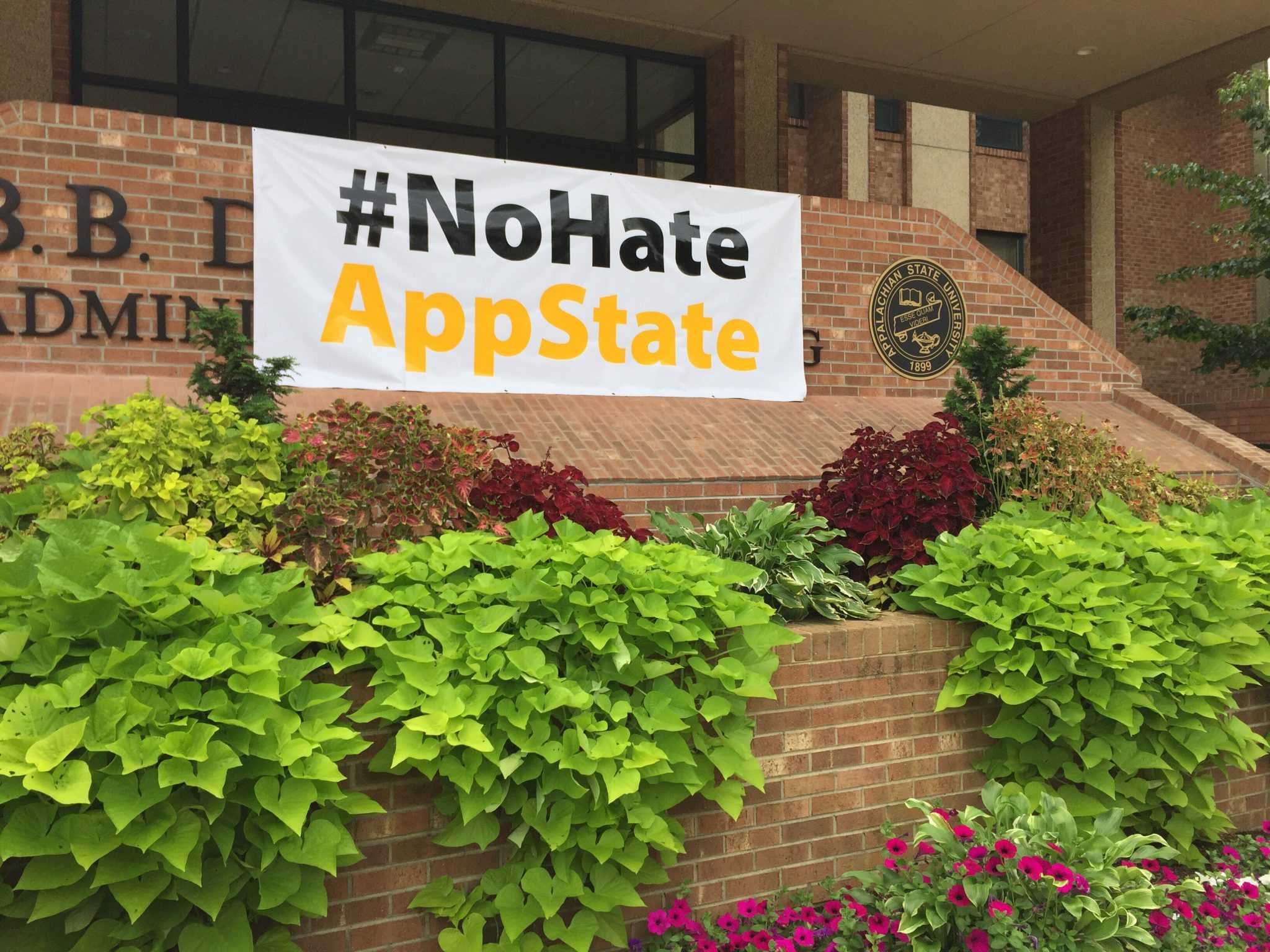“I affirm that there is no place for hate on our campus. Members of our Appalachian Community will stand together against violence, discrimination, injustice and racism of any stripe,” Sheri Everts, Appalachian’s Chancellor, said in an email in the aftermath of the Charlottesville white nationalist attacks.
Now, in the weeks following this email, students walking around campus can barely turn a head without seeing bold black letters on banners, signs and even stickers and pins of the chancellor’s hashtag of choice: #NoHateAppState.
In spite of the hashtag being blasted by Appalachian, in the past week students have also seen a recruitment banner from Identity Evropa, a group who claims on their website to be “a generation of awakened Europeans who have discovered that we are part of the great peoples, history, and civilization that flowed from the European continent.”
Although the banner offered no direct threat towards minority groups on campus, Watauga NAACP President Todd Carter voiced his concerns about the intentions of the banner in a recent news release.
“Make no mistake, this was an act of hate,” Carter said. “The banner was intended to intimidate and incite fear among the African American, Jewish, LGBTQ, minority and immigrant student populations at the beginning of the school year.”
It does not matter that Identity Evropa is not a campus organization. The important thing is that they have made their presence and intention very clear. They are in the community and feel confident in their efforts to recruit on our campus.
#NoHateAppState is not enough. Despite these words posted across campus, hate still reigns. Students of color now walk in fear of white supremacist groups, lurking in the shadows, facing no repercussions for their actions.
Simone Walkowe, a sophomore biochemistry major, said she feels more fear while walking to class each day for simply being pansexual, female and a person of color.
“This is no longer a community I have the right to call a home,” Walkowe said. “I feel as though the university is only doing so much because they are afraid of doing more for people who are not only the minority on a day-to-day basis, but also a minority on campus. What I mean by that is the university will only do so much, because only a few people will be truly affected.”
Walkowe also said that she was not content with the message #NoHateAppState.
“Hashtags are for people who care for five seconds. Change is for people who care. Period,” Walkowe said.
#NoHateAppState is a short form response to a long-term, long-reaching problem. It cannot effectively serve to represent and support the experiences of our diverse student population. Of course there are many people who this hate will not affect; the hatred is not toward them.
For students of color, Jewish students and other minorities, the administration’s hashtag does not effectively address hate, but erases hate already present on campus. Erasure of the significance of hate-driven events makes similar actions more probable because there is a sense of security for those who perpetrate them.
White nationalist groups are welcome to march on our campus. The administration has sent a clear message that they will not be punished for doing so.
In their effort to prevent Boone from becoming the next Charlottesville, our administration has made it far more likely for similar events to occur by not issuing a clear disapproval of the actions of white supremacist groups.
I want to be clear, I am not promoting any violence or hate speech from the groups affected by these events. However, it is crucial that we all recognize the difference between the free speech that groups are requesting.
Student protest groups on campus, both organized and informal, are requesting a space to fight against “discrimination, racism and injustice” as is the hope of Chancellor Everts in her own words.
White supremacist groups, on the other hand, are requesting a space to threaten groups physically, verbally, or by any other means such that the group reasonably believes that the threat is likely to be carried out. Examples of this include intimidation and coercion.
If this phrase sounds familiar, it is because it is pulled directly from the Appalachian State University Code of Conduct.
This I am sure of: as long as hate groups maintain a place on campus, students who stand against them will speak out against them. The answer to hate is not to ignore it, as our leaders would have us believe, but to face it head-on and to tell those who preach it that they are not welcome here.
Do not let #NoHateAppState blind you. Hate is real. Even if we stand without support, hate is ours to fight.
#FightHateAppState
Nora Smith is a sophomore Journalism and GAIT major from Spartanburg, SC. Follow her on Twitter at @noraagracee

